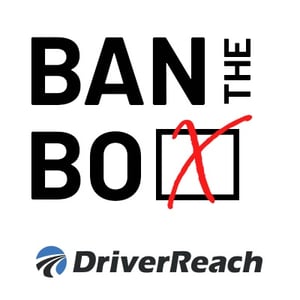In late 2017, California (CA) passed a law restricting how and when employers may consider criminal history information during the hiring process. This new “ban-the-box” law became effective on Jan. 1, 2018, and applies to all CA employers, including motor carriers, with five or more employees.
Counting CA, thirty States have adopted statewide ban-the-box laws or policies. Not surprisingly, the CA law goes further than most other State laws by (1) prohibiting all criminal law inquiries prior to a conditional job offer; (2) requiring an individualized assessment; and (3) requiring a written notification process to applicants. However, there is an important, limited exception to number (1) above for motor carriers. Following is a summary of CA’s law.
- Actions Prohibited - The law prohibits:
- Including on any application for employment (prior to a conditional job offer) any question seeking the applicant’s conviction history.
- Inquiring into an applicant’s criminal history prior to the extension of a conditional job offer.
- Considering or distributing the following information while conducting a conviction history background check: arrests not followed by a conviction; referrals to participate in a pre-trial or post-trial diversion program; convictions that have been sealed, dismissed, expunged by law.
- Interfering with the exercise of any right provided under the statute.
- Individualized Assessment Required - CA’s law requires that, in the event an employer intends to deny employment to an applicant based in whole or in part on the applicant’s criminal conviction history, the employer must make an individualized assessment of whether the conviction history is related to the job. This assessment must include consideration of the nature and gravity of the offense, the date of the offense and the completion of the sentence, and nature of the job.
- Two-Step Written Notification Process Required - CA’s law also requires that employers comply with a written notification process similar to that required by the Fair Credit Reporting Act. If an employer makes a preliminary determination that an applicant’s conviction history may be disqualifying, the employer must inform the applicant in writing. This written notification must contain certain categories of information identified in the law. The employer must then provide the applicant with 5 business days to respond to the notice before making a final decision – and the employer must consider any information provided by the applicant during the 5-day timeframe. If the employer makes a final decision to deny employment based on the applicant’s conviction history, the employer must send another written notice to the applicant. The second and final written notification must contain certain categories of information identified in the law.

Motor Carrier Considerations & An Important Exception
As motor carriers review their hiring and driver qualification processes to ensure compliance with these CA requirements, they should consider the following:
- Criminal history questions must be removed from employment applications, and questions about or inquiries into criminal conviction history must be moved to a point after a conditional offer of employment has been made.
- CA’s law permits employers to make criminal conviction inquiries limited to convictions that would restrict employment in a commercial driving position pursuant to state, federal, or local law. This is an important, limited exception to the general prohibition. As a result of this exception, prior to a conditional offer, motor carriers are permitted to make limited inquiries regarding disqualifying criminal offenses identified in 49 C.F.R. Sections 391.15 and 383.51.
- Prior to extending a conditional offer of employment, motor carriers must be careful to ensure that background checks conducted with third-party consumer reporting agencies exclude criminal history information.
- A conditional offer of employment must be a bona fide offer. This means that, at the time the conditional offer is extended, the motor carrier has considered all hiring factors that it reasonably could have considered at that point. If a motor carrier conditions an offer on factors that reasonably could have been exhausted, it risks a determination that it did not extend a bona fide conditional offer.
- The written notice requirements are in addition to the adverse action notice requirements in the federal Fair Credit Reporting Act. For example, even though a one-step notice may be required under the FCRA for remote driver-applicants applying by electronic means, the two-step notice is still required under the CA law. Thus, in all cases, motor carriers should comply with the adverse action notice requirements of both the FCRA and CA law.
Important Note: This information is intended as a summary of CA’s ban-the-box law, and should not be relied upon as legal or compliance-related advice.
By Dave Osiecki, President of Scopelitis Transportation Consulting. If you have question, contact DriverReach’s regulatory and compliance expert, Dave Osiecki at dosiecki@scopelitisconsulting.com




